




 |
   |
 |
|
Doug Ashdown Corin Ashley Ashra |
Susan Ashton Asia [US] |
Asia [UK] Asia Minor |
Ásmegin Asteroid No. 4 |
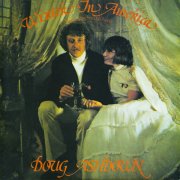 |
Winter in America [a.k.a. Leave Love Enough Alone] (1974, 38.35) ***/½ |
|
| Leave Love Enough Alone Willie's Shades (I Know You) You're the Song Love Ain't Worth the Livin' When it Dies The Flowers and the Wine Skid Row Sally Broome You Are All I Need to Know of Love |
Jeannie They Always Seem to Look Like Marianne Tomorrow is the Last Time No Other Words Leave Love Enough Alone (Reprise) |
|
Current availability:
Mellotron used:
Doug Ashdown was your 'typical' '70s singer-songwriter (Aussie division); still is, by the look if it. Roughly comparable to James Taylor (he says, without having ever really heard Taylor properly), at least on 1974's Winter in America, he sang melancholy little vignettes of people's lives like Sally Broome, or 'end of the affair' songs like The Flowers And The Wine or Leave Love Enough Alone. Actually, there's some confusion surrounding the album; when I finally found a copy, I realised I'd seen it before, titled something else (possibly Leave Love Enough Alone). That's the 'subtitle' on my copy and the main title on the label. Huh? It's not even a US title, designed to sell more over there, but it's called Winter in America on his site...
This is very standard fare, to be honest, like many, many others in the same area, although I imagine Ashdown cleaned up the bedsitter market in Australia. Remove the orchestral accompaniment and the occasional faux-country trappings (They Always Seem To Look Like Marianne) and it'd be better, although it's very much of its time; were he making this album today, it'd have light trip-hop beats behind his voice and guitar, if you know what I mean. Anyway, two Mellotron players, Roy Ritchie and overall keys man, Wayne Findlay, although all I can hear is a choir part on Sally Broome; what, it took two of you to do that?
 |
New Lion Terraces (2013, 40.16) ***½/T |
|
| Geez Louise Sgt. Sunshine Marianne Badfinger Bridge God Shaped Hole New Lion Terraces On the Ledge |
Malady Second Hand Halo Eyeshine |
|
Current availability:
Mellotron used:
Boston's Corin Ashley, once of The Pills and Atlas Shrugged, released his second album, New Lion Terraces, in 2013, an intriguing combo of '60s mod-pop, later powerpop tropes and more intimate singer-songwriter material. Highlights? Opener (of course) Geez Louise, Badfinger Bridge (nothing like naming your influences, eh?), Second Hand Halo and closer Eyeshine.
Brendan Haley plays Q Division's studio M400, with background strings on Marianne and upfront ones on the title track, although all other possible sightings appear to be an actual string section. Since the album's release, Ashley has suffered a stroke, but, according to reports, has largely recovered, releasing Broken Biscuits in 2017; Planet Mellotron sends its good wishes.
See: Atlas Shrugged
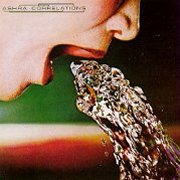 |
Correlations (1979, 42.35) **½/T½Ice TrainClub Cannibal Oasis Bamboo Sands Morgana da Capo Pas de Trois Phantasus |
Current availability:
Mellotron used:
Ashra were originally known as Ash Ra Tempel, but had, by the late '70s, morphed into a rather more mainstream outfit. After 1977's chilled-out New Age of Earth, Correlations came as a bit of a surprise, launching straight in with the rhythmic Ice Train, best described as 'Teutonic funk'. There's a distinct attempt to find the er, 'groove', rather hampered by the musicians' backgrounds in the German electronic scene; in other words, it swings like the proverbial dead man's penis. Talking of musicians, mainman Manuel Göttsching was joined by drummer Harald Grosskopf and extra keyboard man Lutz Ulbrich, who plays Mellotron on the album.
Like the music, the Mellotron use isn't particularly inspired, to be honest; faint choirs on Ice Train, so-so strings on Club Cannibal and (presumably Mellotron) cellos on Morgana Da Capo. As an instrumental synth-funk album, I have to say that Correlations is a bit of a failure; Pas De Trois is eight minutes long, which is probably about six minutes too many. I kept finding myself wishing each track would finish, hoping that its successor would be better, but constantly being disappointed. All three musicians involved have previously made considerably better music; Correlations seems to be a misguided attempt to 'go commercial', in which I'm fairly sure it failed dismally. Sorry, chaps; play from the heart, not the wallet. Cool Hipgnosis sleeve, though.
See: Ash Ra Tempel
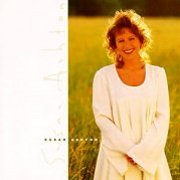 |
Susan Ashton (1993, 49.32) **/T |
|
| Summer Solstice Waiting for Your Love to Come Down Remember Not There is a Line Heart Like a Rock Agree to Disagree Hold the Intangible Call of the Wild |
No Remedy for Love A Rose is a Rose |
|
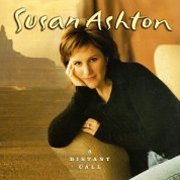 |
A Distant Call (1996, 52.53) ½/½ |
|
| You Move Me Blind Side Body and Soul All Kinds of People Crooked Man Spinning Like a Wheel Hundreds of Tears Send a Message |
I Will Follow Lonely River Love Profound |
|
Current availability:
Mellotrons/Chamberlins used:
Another pair of Nick Hewitt CCM reviews, folks! God, he loves this stuff... Unlike Nick.
Susan Ashton may well be her debut album, I suspect it is - I don't know and to be honest, due to my general dislike of CCM, I don't particularly care. However, as CCM goes, this is better than average. There again, CCM, to my ears, has an inherently low average anyway.
At best, this is MOR-cum-singer/songwriter fare, with a small variety of external non-CCM tinges, such as a bit of C&W, a bit of light jazz and even a hint of rock. One track has, for a while, a riff that is very reminiscent of (Don't Fear) The Reaper by Blue Öyster Cult, but it doesn't last long - unfortunately! She (Susan that is) does try to be a little different within the genre she knows she is inhabiting, which is to be applauded. Unfortunately, it doesn't last long, as A Distant Call will show. The songwriting, done by herself, mostly in partnership with a Wayne Kirkpatrick, is a bit better than adequate. In general musical terms, it's a bit bland, but within CCM, it is definitely NOT run-of-the-mill CCM, for which she must be congratulated.
The two tracks credited with Mellotron are contrasting. I can't make it out in Waiting For Your Love To Come Down, as there is so much in the background, albeit quietly. There is something there, but to my ears it sounds like a string synth. However, on Hold The Intangible, it is more than noticeable; an initial quiet burst of choirs, followed by something more substantial. It doesn't enhance the music much, as Mellotron doesn't really fit in to a CCM/MOR context - well, I don't think it does! According to the cassette insert, the Mellotron player is a John Mark Painter, who is quoted as playing 'Mellotron Strings and Choir', on BOTH tracks.
Ms Ashton released A Distant Call a few years later and... well, it's a bad 'un. Typical Contemporary Christian Music (CCM) done by an American and not a surprise to be heard. A woman, with a perfectly acceptable voice warbles on about her chosen religion and we're supposed to be inspired by it? - not a chance! Like a lot of stuff put out by fairly anonymous artistes, the music is pretty insipid, giving more credence (to the advocates of CCM) that the 'Message' is more important than the music. BOLLOCKS! - Not in this review, sunshine.
Right, that's got that out of my system. The music is typical run-of the-mill pseudo-C&W, almost verging towards The Eagles, definitely in the MOR mould. Well, I don't want MOR - I want less. The album has the unfortunate property of each track having an introduction that is considerably better than the crux of the song, giving rise, to my mind, that this form of CCM is a trap. It's trying to catch the unwary into thinking that the music is 'this' when it turns out to be 'that' - not always a good idea and definitely not in this case. Having said that, in a lot of the tracks, I keep hearing traces of The Christians [how appropriate... Ed.], as I also could on her eponymous album. In this case, it's bits of their 2nd LP I keep picking up on, which was, funnily enough, panned for being over-produced. So has this, but it needs to be as it is so bad. I can't understand this, as the album she made three years previous to this was so much better.
Mellotron appears on the one track and like all Mellotron on CCM, it is utterly wasted. It's quoted on the cassette inlay as 'Mellotron, Strings, Chamberlin Flute - Brown Bannister', whatever that means. It's probable that the comma between 'Mellotron' and 'Strings' should be omitted. I've reviewed the cassette version, so I cannot comment on the accuracy of the label, the precise running time (which I've timed myself) or its availability. In the latter case, I can only pray (!) that it's as low as possible.
I've given this a rating of ½/½, which is too high on both counts, but Andy Thompson won't let me go any lower. It, therefore, goes without saying that this album should be put in a lead and concrete lined box, marked as 'Danger - Fissile Material' on the outside and sent to the next but one galaxy - please!
Susan Ashton also issued a compilation album called Walk On, also on Sparrow, that includes Waiting For Your Love To Come Down. Bad choice Susie!
| Nick Hewitt |
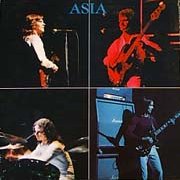 |
Asia (1979, 41.24) ***½/T½Love May Be GoneA Better Man for Leavin' The Taming of the Bull The Road of Kings Law of the Land Requiem |
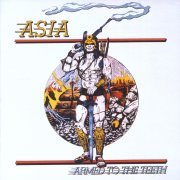 |
Armed to the Teeth (1980, 36.27) ****/TTTTThunder RiderXanadu Kamikaze Paladin Genghis Khan The Bard |
Current availability:
Mellotron used:
The original Asia formed in 1977 from the ashes of another South Dakota outfit, White Wing and most of their debut, '79's Asia is comprised of rearranged White Wing material. The band consisted of two guitars/bass/drums, with one guitarist, Mike Coates, doubling on keys in the studio. The album has a sophisticated mid-'70s US hard rock sound, with progressive overtones, betraying the band's influences in British progressive rock. Coates' classical training shows in the unusual guitar harmonies, while the album's two longest tracks, The Taming Of The Bull and Requiem both feature explicitly 'progressive' arrangements, making this something of a treat for the hard rock/prog crossover fan. Coates only played Mellotron on one track, The Taming Of The Bull, but he slapped strings all over the thing, making for a T½ rating.
Armed to the Teeth is slightly more sophisticated than its predecessor and definitely has a better sound, although there are also hints of a potential future AOR direction on a couple of tracks. There's a distinct 'Eastern' sound and concept to the album, most track titles alluding to the Far East; using the title Xanadu after Rush's epic from only three years earlier was possibly a mistake, although Coates only mentions Olivia Newton-John's single of a few months later. Coates goes for it on the Mellotron front in a big way this time, with strings on every track, plus flutes and cellos on closing ballad The Bard. His use isn't always 'typical', but where's the problem in that? I feel that the band could probably have benefitted from having a full-time keyboard player, as a Hammond backdrop to many of the tracks would've worked well, as would some monosynth work, although those newfangled polysynth things wouldn't have fitted in with the band's sound at all.
Of course, the shit hit the fan for Asia when the tedious UK supergroup of the same name appeared a year or so later. It seems there was much legal wrangling, not to mention bullshit in high places, which ended, unsurprisingly, with the British outfit gaining full control of the name and the Americans dissolving amidst acrimony and debt. That was pretty much it for the band until the mid-'90s, when Michael Piper of The Wild Places reissue label stumbled across a copy of Armed to the Teeth. After much negotiation, transfers were made from pristine copies of the albums (the tapes having been lost in the interim) and they're now available from the label on a 2-on-1. Coates elected to put their sophomore effort first, as they were more pleased with the end result, but to my ears, they would've worked better in sequence, but that's what programmable CD players are for, isn't it?
See: White Wing
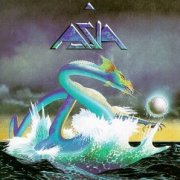 |
Asia (1982, 44.13) **/½Heat of the MomentOnly Time Will Tell Sole Survivor One Step Closer Time Again Wildest Dreams Without You Cutting it Fine Here Comes the Feeling |
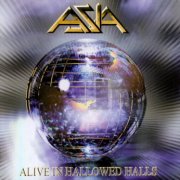 |
Alive in Hallowed Halls (2001, recorded 1983, 54.32) **/TT |
|
| Intro Time Again Wildest Dreams Without You Midnight Sun Only Time Will Tell Daylight The Smile Has Left Your Eyes |
Keyboard Solo Don't Cry Open Your Eyes Ride Easy |
|
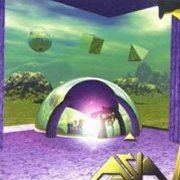 |
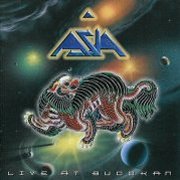 |
Enso Kai - Live at the Budokan, Tokyo 1983 (2001, 57.29) **/½ |
|
| The Heat Goes on Here Comes the Feeling Eye to Eye Steve Howe - Guitar Solo Only Time Will Tell Open Your Eyes Geoffrey Downes - Keyboard Solo The Smile Has Left Your Eyes |
Wildest Dreams Heat of the Moment Sole Survivor |
||
Current availability:
Mellotrons used:
It's fairly unlikely that you've never heard Asia, especially if you're the wrong side of forty (fifty?); they were irritatingly ubiquitous in the early '80s, while 1982's Asia was an exceedingly major hit. All the progheads went wild when the band's formation was announced: "Howe, Wetton, Palmer and er, that bloke from Buggles? Dream team!" Except... it wasn't. Far from being a prog supergroup, Asia were out-and-out AOR, with the occasional pomp flourish to keep the old fans happy. Asia produced two HUGE hits in Heat Of The Moment and Only Time Will Tell, which made them an awful lot of money, while not endearing them to old proggers in the slightest. Like they cared.
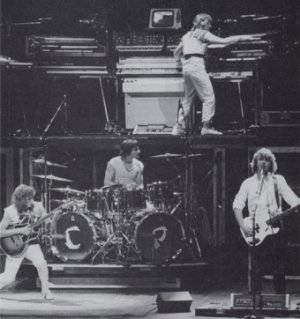 |
Geoff Downes was a total keyboard freak, with the most outrageous collection of instruments; on their second tour, he lined up thirty or forty of the things (right) on a riser along the back of the stage, then just moved up and down the line during the set. In the middle of the massed banks of keys was his Mellotron M400; he may have used it more live than in the studio, but as far as I can hear, it's on just one song on Asia, Cutting It Fine and not much at that (a small burst of choir), although it's hard to tell, there's so much going on at once. Now, when I originally reviewed this album, some years ago, I wrote this:
This will probably piss a few people off, but I feel I have to say it. I hate Asia. Sorry, but I really, really can't stand them. Asia is immaculately produced and generally brilliantly done, but I loathe it. It flies in the face of everything about music that I hold dear, especially from musicians of their calibre, who weren't entirely unsuccessful before... Everyone's entitled to make a decent living, but not when they foist this kind of dross on the general public. This gets one star simply in recognition of the work that went into it and the intelligence behind it, not for the music. Avoid.
Harsh? Perhaps, but definitely how I felt at the time. Having just listened to the album again for the first time since that roasting, I think it would be a lot fairer to say that, despite its excessively commercial leanings, it's difficult to fault it for what it is. What's more, I find that I actually quite like the pomp one-two of Time Again and Wildest Dreams, despite myself, not to mention the killer MiniMoog/Taurus intro to Only Time Will Tell. I still can't seriously recommend this on any realistic level, but it's possibly not quite as awful as I once thought.
If you're of a seriously masochistic bent, there are a couple of recently-released live albums from this phase of the band's career, both of which feature a bit of Mellotron. The first is 2001's Alive in Hallowed Halls, a proper dog's dinner of a release, allegedly from Detroit in September '83, although bootleg evidence apparently says 'no'. Keen fans commenting on Amazon have pointed out that a) Midnight Sun begins in the middle of the song and b) Don't Cry has the opening from the studio version tacked on, not to mention c) that closer Ride Easy is actually a studio track. Musically, this could be a lot worse, but sonically, it's horrible, sounding more like a bootleg than something on which you'd want to spend proper money. Interestingly, Downes uses his Mellotron more here than on any other Asia recording, with choirs backing the harmony vocals on Time Again, Wakeman-style, an upfront string part on Midnight Sun and choirs on The Smile Has Left Your Eyes and Downes' solo spot, leaving us with two Mellotronic conundrums. You only get three sounds per tapeframe, so the only way of using more sounds without changing tapes mid-set (!) is to have custom ones made, splitting one or more of the selections, then playing very judiciously. Did Downes do this? Mellotronics were still in operation at this point, so it's not inconceivable... Tell you what, I'll really put my reputation (hah!) on the line and suggest that he might've done exactly that, meaning that both what sounds like the Mellotron church organ opening and closing Daylight and the tubular bells at the end of Wildest Dreams, with that 'hitting lengths of scaffolding pole' (© Mike Dickson) sound about them are both Mellotron. Or one or the other. Or neither. who knows? Either way, despite the awful quality, this is actually Asia's top Mellotron album, for what it's worth.
It was followed swiftly by Enso Kai - Live at the Budokan, Tokyo 1983, from their brief 'Greg Lake' period, after temporarily falling out with Wetton, reissued the following year as Live at Budokan, with two extra tracks. Well, despite somewhat disliking their studio work, it's difficult to fault this at what it does, although most of the material's still highly irritating. Only Time Will Tell still has a great intro (but that's it), while most of the rest passes me by without really making any impression. Downes sticks a bit of Mellotron choir onto Eye To Eye, but that's your lot, so don't even think about this on that front.
To my knowledge, Asia never recorded Downes' Mellotron again after their debut, although the jury's out on the background choirs on The Smile Has Left Your Eyes (ugh) on the following year's Alpha.
See: Steve Howe | Yes | John Wetton | Buggles | Emerson, Lake & Palmer | Asia Featuring John Payne
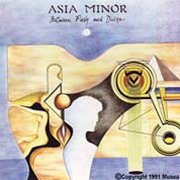 |
Between Flesh and Divine (1980, 34.01) ****½/TTNightwindNorthern Lights Boundless Dedicace Lost in a Dream Yell Dreadful Memories |
Current availability:
Mellotron used:
Asia Minor were a French/Turkish band who released two albums around the turn of the '80s, inserting a unique near-Eastern influence into a by-then decade-old genre. Their first album, '79's Crossing the Line (****) was good, but they'd honed their sound even further by 1980's Between Flesh and Divine. Actually, this is a seriously underrated band; they had a fantastic sound and the material is top-notch, with excellent dynamics and instrumental colouring, not to mention an unsurprising Arabic feel in places.
In the keyboard department, Robert Kempler relied heavily on a string synth, with occasional bursts of organ and monosynth in places. The Mellotron choirs on three tracks are heavily understated, except on closer Dreadful Memories, where they leap out of the mix in a fairly startling manner. I wouldn't go as far as to say that Between Flesh and Divine is a Mellotron Album per se, but it's more than worthy of your attention for the excellent music. Buy.
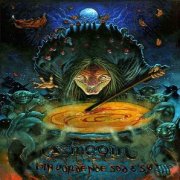 |
Hin Vordende Sod & Sø (2003, 42.09) ***/T |
|
| Af Helvegum Bruderov Paa Hægstadtun Huldrandans - Hin Grønnkledde Til Rondefolkets Herskab Over Ægirs Vidstragte Sletter Slit Livets Baand Efterbyrden Op af Bisterlitjernet |
Vargr i Véum Blodhevn Valgalder |
|
 |
Arv (2008, 42.14) ***/T½Fandens MælkebøtteHiertebrand Generalen og Troldharen Arv Yndifall Gengangeren Prunkende, Stolt i Jokumsol En Myrmylne |
Current availability:
Mellotrons used:
Ásmegin (By the Might of the Gods) are a Norwegian Viking metal band (stop laughing), incorporating elements of thrash, death metal and Scandinavian folk into their sound which, maybe surprisingly, actually works, by and large. Alongside the obligatory death-grunting and downtuned riffs, violin, accordion, flute and female vocals vie for the listener's attention, while the core band slots Norwegian folk melodies, complete with massed vocal harmonies, into their epic metal stew.
Their debut album, 2003's Hin Vordende Sod & Sø (The Prospective Broth & Soup, apparently), has moments of greatness, but more moments of considerable silliness, unless you can actually take that faux-aggressive metal stance seriously (please don't tell me you can). The folk influences and unusual instrumentation are the album's saving graces, making for a partially listenable album for those of us not privy to metal's dark secrets. Norway's primo Mellotron man, Lars Fredrik Frøislie (Wobbler, White Willow, many others) guests on various keys, including Mellotron, although he's since joined properly (how does he find time to play in all these bands? I think we should be told), although all I can hear is a flute part on closer Valgalder, quite distinct from the album's real flutes.
Five years and some lineup changes later, Arv (Heritage) is, essentially, more of the same, although I'm sure fans of the genre could point out the album's differences at some length. More violin, more folk melodies, more growling; good at what it does, assuming you like what it does. Although Frøislie plays on the album, he restricts himself to Hammond (pretty much inaudible until the last track), leaving Marius Olaussen to play the Mellotron. For some reason, though, unless I'm missing something, he doesn't touch it until near the end of the album, with what sounds like Mellotron strings and cellos under the real violin on Gengangeren, definite flutes on Prunkende, Stolt I Jokumsol and a full-on string part on closer En Myrmylne.
Overall, then, two relatively inventive metal albums, although the band's failure to distance themselves from the genre's sillier aspects hampers any chance of acceptance from a wider audience. Like so many genre outfits, though, I doubt whether they have any interest in appealing to anyone else, so that probably isn't regarded as a problem. Not all that much Mellotron on either, although Arv outdoes Hin Vordende Sod & Sø.
See: Wobbler
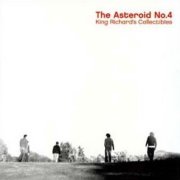 |
King Richard's Collectibles (2001, 46.26) ***½/TT |
|
| Apple Street King Richard Poor Man's Falls Monday Morning Gloom Mercenary Man Gotta Find a Better Way Local Fashion Junky Thank You R.E.A. |
Queen of My Dreams Little Flower You Said Urban Disaster |
|
Current availability:
Mellotron used:
The Asteroid No. 4 have been around since the '90s, releasing their second album, King Richard's Collectibles, in 2001. Gleefully describing themselves as part of 'the third wave of psychedelia', they've filled the album with homages to British '60s pop with a touch of the early '90s thrown in. Rickenbackers at dawn, then, I take it. Best tracks? A matter of opinion, as always, but opener Apple Street sets out the band's stall nicely, while Poor Man's Falls highlights their skills with a quieter number, although there isn't actually a bad track here, to be honest. About the only fault I can level at the album is its occasional propensity for over-influence: Monday Morning Gloom has a little too much of the early Beatles about it, while Mercenary Man is '65 Dylan to a tee, although most of the tracks' influences are general rather than specific.
Chris Zurzolo plays Mellotron on three tracks, with a minor flute part on the intro to Monday Morning Gloom being completely outclassed by a very major one on Little Flower, highly audible at the end of the track. He switches between flutes and strings on Urban Disaster, making for a nice hat-trick of Mellotron tracks, although he could easily have squeezed it onto a couple of others, too. So; one for those of you searching for lesser-known psych, even if it's current. What you'll get is a good-but-not-jaw-dropping album, with a couple of cool Mellotron tracks, making them one of the better 'know nothing about them' bands I've reviewed recently. Worthwhile.
See: Peter Daltrey & Asteroid No. 4